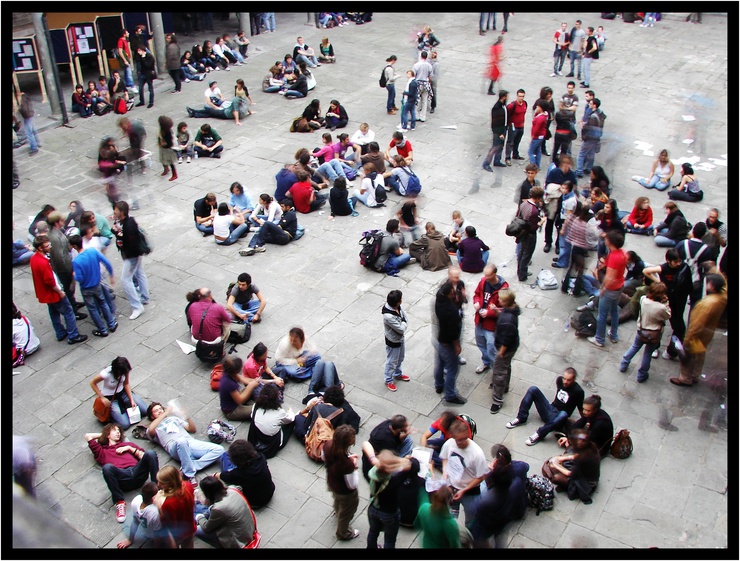
'Bad' Italians at La Sapienza university: politicians don’t want us to think
Published on
The stability law proposed by the Italian government foresees education cuts, affecting the already uncertain future of the young generation in Italy. Between 'No Monti' anti-austerity protests, the threat of the erasmus programme being cut and anger at the accusation of being 'choosy', young Italians explain their views
While lovely sunny days welcome tourists in Rome, the hubbub around La Sapienza university sends vibes of confusion, disappointment, rebellion and anger. On 27 October thousands of mostly Italian students are to stage a No Monti day protest - a large poster on one of the university’s building tips me off. The anti-austerity protest targets Italian prime minister Mario Monti and the EU-imposed austerity measures. The stability law proposed by the Italian government foresees essential cutting of funds in the education system, affecting the already uncertain future of the young generation in Italy.
Good citizens don’t think
The cuts also threaten the erasmus student exchange programme that has brought together students from all over Europe for 25 years.‘We are doomed,' says Eleonora Massi, as we sit and chat at La Sapienza; she has just got back from her erasmus stint in Norway. ‘I do not know if there is a way out. Erasmus allowed me to explore a parallel reality. Oslo is very multicultural; you actually feel you are outside of the EU. Norwegians do not really care about the Union. It seems like they have made the right decision.’ Others like Edoardo, a first-year student at La Sapienza, have not had the chance to take part in the erasmus programme yet. ‘Erasmus is a formative experience even more so than school years,’ he says. ‘If I do not go it would be a lost experience.’
 Insufficient funds for erasmus is just one side of the coin; cuts in education do have bigger consequences. Teachers would be required to work six more hours on the same salary. ‘Predictably, the proposed cuts will result in fewer teachers to more pupils, less activities, less time and energy devoted to the children, thus in a general decrease of teaching quality’, says professor Alessandro Natalini. ‘Similar difficulties for the pupils have been observed since 2008 when around 80, 000 teachers’ positions were reduced. This was accompanied by a decline of exchange projects for pupils similar to erasmus, such as Comenius.' Natalini highlights the lack in understanding of the gravity of the situation. ‘The crisis is just an alibi,' he says. ‘Educated people are hard to manipulate; reasoning leads to revolts. Instead, uneducated people are deprived of their protesting powers’.
Insufficient funds for erasmus is just one side of the coin; cuts in education do have bigger consequences. Teachers would be required to work six more hours on the same salary. ‘Predictably, the proposed cuts will result in fewer teachers to more pupils, less activities, less time and energy devoted to the children, thus in a general decrease of teaching quality’, says professor Alessandro Natalini. ‘Similar difficulties for the pupils have been observed since 2008 when around 80, 000 teachers’ positions were reduced. This was accompanied by a decline of exchange projects for pupils similar to erasmus, such as Comenius.' Natalini highlights the lack in understanding of the gravity of the situation. ‘The crisis is just an alibi,' he says. ‘Educated people are hard to manipulate; reasoning leads to revolts. Instead, uneducated people are deprived of their protesting powers’.
'Choosy'
Eleonora agrees; education cuts are ‘a diabolic plan’. Is Italy experiencing an illusion of democracy? ‘Students in particular know less and less,' she says. 'They are not well-informed. There is a general ignorance. Their protests do not have an echo and as a result the government does not pay attention. Protesting and making your voice heard is the core element of democracy.' While she may feel powerless faced with a political class that pretends to listen, Eleonora suggests a more radical form of protest. 'If at least a majority of voters cast an invalid ballot, it would send an important message.'
‘Maybe my mom can tell me I am being choosy, but not the minister'
Youngsters in Italy were angered by a statement from Elsa Fornero, labour and welfare minister, when she declared that the Italian youth should not be 'choosy' (she used the English word) when looking for jobs. ‘Maybe my mom can tell me I am being choosy, but not the minister,' says MonicaMastroianni, a radio journalist specialised in human rights issues. 'I was very disturbed when I heard that,' adds Eleanora. ‘Young people are ready to make sacrifices, but our politicians are out of touch; they are rich and do not understand us. While it is true that compared to the Berlusconi years, the situation has improved on an ethical level, there is no space for the young generation. Or better say, there are spaces, but there is no will to use the energy of young graduates.'

The situation does not look better for researchers either. A recent study conducted by the association of Italian PhDs, PhD candidates and researchers (ADI) reveals negative trends regarding the number of scholarships available for research, with a decline of 25.9% in the number of scholarships between 2009 and 2012. ‘The lack of funding for research is negatively affecting the quality of Italian research sectors, which used to be at the top,' explains Francesco Vitucci, national secretary of ADI. ‘It does have an effect on research freedom. While these researchers work on temporary contracts, they are the first to be fired. Nor is mobility guaranteed anymore; it does not allow young researchers to be inserted internationally and get a feel of the best experiences and practices from all over the world.' So what does the future hold for this young Italian generation? The future is uncertain. After having spent months in Scandinavia, Eleonora knows she does not want to stay in her native Italy where the doors are closed to the young generation.
This article is part of the final edition of cafebabel.com’s flagship project of 2012, the sequel to ‘Orient Express Reporter II‘, sending Balkan journalists to EU cities and vice versa for a mutual pendulum of insight. Thanks to the folks from cafebabel Rome
Images: main © zibibboo ; in-text © geomangio; © jerik0ne/ Flickr



